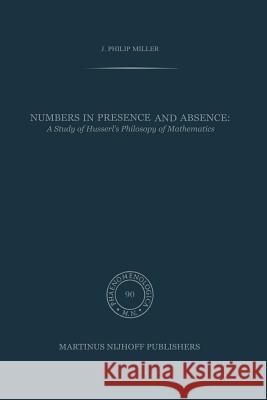Numbers in Presence and Absence: A Study of Husserl's Philosophy of Mathematics » książka
topmenu
Numbers in Presence and Absence: A Study of Husserl's Philosophy of Mathematics
ISBN-13: 9789400976269 / Angielski / Miękka / 2011 / 160 str.
Kategorie:
Kategorie BISAC:
Wydawca:
Springer
Seria wydawnicza:
Język:
Angielski
ISBN-13:
9789400976269
Rok wydania:
2011
Wydanie:
Softcover Repri
Numer serii:
000029619
Ilość stron:
160
Waga:
0.25 kg
Wymiary:
23.5 x 15.5
Oprawa:
Miękka
Wolumenów:
01











